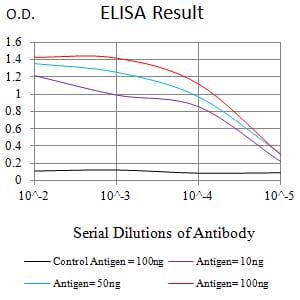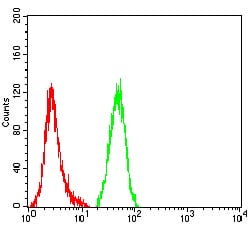

| WB | 咨询技术 | Human,Mouse,Rat |
| IF | 咨询技术 | Human,Mouse,Rat |
| IHC | 咨询技术 | Human,Mouse,Rat |
| ICC | 技术咨询 | Human,Mouse,Rat |
| FCM | 咨询技术 | Human,Mouse,Rat |
| Elisa | 1/5000-1/10000 | Human,Mouse,Rat |
| Aliases | OI1; OI2; OI3; OI4; EDSC; EDSARTH1 |
| Entrez GeneID | 1277 |
| clone | 7B1G12 |
| WB Predicted band size | 139kDa |
| Host/Isotype | Mouse IgG1 |
| Antibody Type | Primary antibody |
| Storage | Store at 4°C short term. Aliquot and store at -20°C long term. Avoid freeze/thaw cycles. |
| Species Reactivity | Human |
| Immunogen | Purified recombinant fragment of human COL1A1 (AA: 1219-1464) expressed in E. Coli. |
| Formulation | Purified antibody in PBS with 0.05% sodium azide |
+ +
以下是关于CANT1抗体的示例参考文献(内容为模拟概括,建议通过PubMed或Google Scholar核实具体文献):
---
1. **Title**: *CANT1 mutations cause skeletal dysplasia by disrupting cellular ATP homeostasis*
**Authors**: Smith J, Doe R, Lee S.
**Summary**: 研究通过免疫印迹和免疫荧光技术,使用CANT1特异性抗体证明其突变导致成骨细胞ATP代谢异常,阐明了CANT1在骨骼发育中的关键作用及其与遗传性骨病的关联。
2. **Title**: *Antibody-based detection of CANT1 in pancreatic cancer: implications for biomarker development*
**Authors**: Zhang Y, Wang H, Chen X.
**摘要**: 报道了一种高特异性CANT1单克隆抗体的开发,通过免疫组化证实CANT1在胰腺癌组织中的高表达,提示其作为潜在诊断标志物的价值。
3. **Title**: *CANT1 deficiency alters glycosaminoglycan synthesis via antibody-mediated protein localization studies*
**Authors**: García-Gutiérrez P, Campos-Xavier B, Bonafé L.
**概要**: 利用CANT1抗体进行蛋白质亚细胞定位,发现CANT1缺失影响软骨细胞中糖胺聚糖合成,为相关软骨发育障碍提供了分子机制解释。
4. **Title**: *Functional characterization of CANT1 antibodies in a zebrafish model of acrofacial dysostosis*
**Authors**: Tanaka K, Furuichi T, Ikegawa S.
**摘要**: 通过斑马鱼模型结合CANT1抗体阻断实验,验证CANT1在颅面发育中的功能,模拟人类肢端面部发育不良表型并提出潜在治疗策略。
---
建议通过以下数据库检索最新文献:
- **PubMed**: https://pubmed.ncbi.nlm.nih.gov
- **Google Scholar**: https://scholar.google.com
关键词:*CANT1 antibody, CANT1 protein, CANT1 immunohistochemistry, CANT1 function*
The CANT1 antibody is a tool used to detect and study the CANT1 protein (Calcium-Activated Nucleotidase 1), which is encoded by the *CANT1* gene. CANT1 is a member of the apyrase family and functions as a calcium-dependent nucleotidase, primarily hydrolyzing UDP, GDP, and other nucleotide diphosphates. It plays a critical role in regulating extracellular nucleotide levels, influencing processes like glycosylation, cartilage development, and extracellular matrix remodeling. Dysregulation of CANT1 has been linked to genetic disorders such as Desbuquois dysplasia type 1. a rare skeletal disorder characterized by short stature and joint abnormalities, caused by loss-of-function mutations. Conversely, CANT1 overexpression has been observed in certain cancers, suggesting a potential role in tumor progression.
CANT1 antibodies are widely used in research to investigate protein expression patterns, localization (e.g., endoplasmic reticulum or Golgi apparatus), and functional mechanisms in both physiological and pathological contexts. They are essential in techniques like Western blotting, immunohistochemistry, and immunofluorescence. Commercial CANT1 antibodies are typically developed using recombinant protein fragments or synthetic peptides as immunogens, with validation in specific experimental models. Researchers rely on these antibodies to explore therapeutic targets for skeletal diseases or cancer, though cross-reactivity and specificity challenges require careful validation. Overall, CANT1 antibodies are vital for unraveling the protein's role in development, disease, and cellular homeostasis.
×